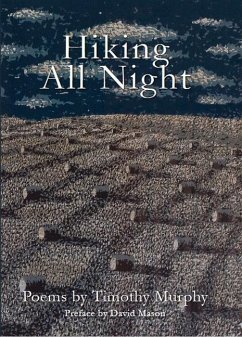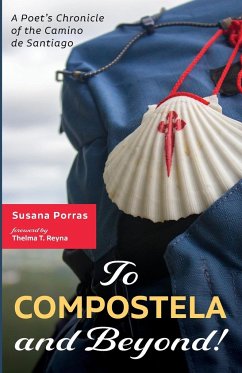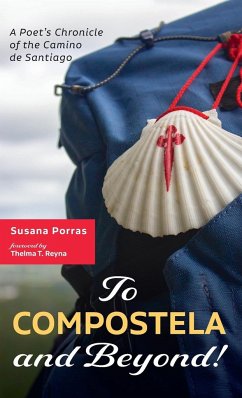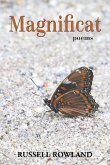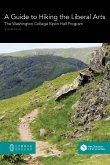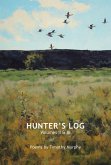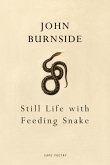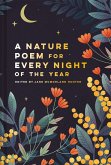- Gebundenes Buch
- Merkliste
- Auf die Merkliste
- Bewerten Bewerten
- Teilen
- Produkt teilen
- Produkterinnerung
- Produkterinnerung
"Hiking All Night explores Murphy's North Dakota roots and his adventures beyond the upper Midwest. Murphy's poetry reflects on friends and loves one, expresses a reverence for their strength, and recognizes the power of spirituality as he comes closer to the end of his own mortal journey"--
Andere Kunden interessierten sich auch für
![To Compostela and Beyond! To Compostela and Beyond!]() Susana PorrasTo Compostela and Beyond!12,99 €
Susana PorrasTo Compostela and Beyond!12,99 €![To Compostela and Beyond! To Compostela and Beyond!]() Susana PorrasTo Compostela and Beyond!25,99 €
Susana PorrasTo Compostela and Beyond!25,99 €![Magnificat Magnificat]() Russell RowlandMagnificat18,99 €
Russell RowlandMagnificat18,99 €![A Guide to Hiking the Liberal Arts A Guide to Hiking the Liberal Arts]() Richard GillinA Guide to Hiking the Liberal Arts56,99 €
Richard GillinA Guide to Hiking the Liberal Arts56,99 €![Hunter's Log: Volumes II & III Hunter's Log: Volumes II & III]() Timothy MurphyHunter's Log: Volumes II & III21,99 €
Timothy MurphyHunter's Log: Volumes II & III21,99 €![Still Life with Feeding Snake Still Life with Feeding Snake]() John BurnsideStill Life with Feeding Snake11,99 €
John BurnsideStill Life with Feeding Snake11,99 €![Nature Poem for Every Night of the Year Nature Poem for Every Night of the Year]() Jane McMorland HunterNature Poem for Every Night of the Year20,99 €
Jane McMorland HunterNature Poem for Every Night of the Year20,99 €-
-
"Hiking All Night explores Murphy's North Dakota roots and his adventures beyond the upper Midwest. Murphy's poetry reflects on friends and loves one, expresses a reverence for their strength, and recognizes the power of spirituality as he comes closer to the end of his own mortal journey"--
Produktdetails
- Produktdetails
- Verlag: North Dakota State University Press
- Seitenzahl: 333
- Erscheinungstermin: 10. Februar 2021
- Englisch
- ISBN-13: 9781946163134
- ISBN-10: 1946163139
- Artikelnr.: 63628792
- Verlag: North Dakota State University Press
- Seitenzahl: 333
- Erscheinungstermin: 10. Februar 2021
- Englisch
- ISBN-13: 9781946163134
- ISBN-10: 1946163139
- Artikelnr.: 63628792
Timothy Iver Murphy of Fargo, North Dakota, passed away in his home on Saturday, June 30, 2018, at the age of sixty-seven. He was born in Hibbing, Minnesota, on January 10, 1951. Raised in Moorhead, Minnesota, he was active in high school speech and debate and graduated from Moorhead High School in 1968 as president of his senior class. Tim was an Eagle Scout and member of the Order of the Arrow. He worked summers at Camp Wilderness near Park Rapids, Minnesota, as a Scout craft aide and a commissioner. Tim attended Yale University, pursuing his interest in poetry and undertaking a tutorial with Robert Penn Warren. He was named Scholar of the House in Poetry, and he graduated from Yale with a BA in 1972. Tim joined his father in the life insurance, pension, and estate planning business, V.R. Murphy and Sons, Inc., winning numerous national sales awards. His entrepreneurial interests led to his raising equity capital for partnerships in a number of local companies: Timco Farms, Bell Farms, Orchard Glen Development, DakTech, and Bytespeed LLC. Tim loved hiking, sailing, farming, and hunting with his black Labs. All were inspiration for his poetry, which was his great passion in life. A fascinating and complicated man, he wrote deceptively simple poetry exploring universal themes: faith, family, spirituality, death, farming, friendship. His work is rooted in place: the Red River of the North, North Dakota, and the Great Plains. His poetry is published in prominent journals including Poetry, Quadrant, Hudson Review, New Criterion, Chronicles, Alabama Literary Review, and Gray's Sporting Journal. His books include The Deed of the Gift (Story Line Press 1998), Set the Ploughshare Deep (Ohio University Press 2002), Mortal Stakes and Faint Thunder (Dakota Institute Press 2011), Hunter's Log (Dakota Institute Press 2011), Devotions (North Dakota State University Press 2017), and Hunter's Log: Volumes II & III (North Dakota State University Press, 2019). Tim collaborated with his long-time partner Alan Sullivan on a translation of Beowulf (Longman 2004). A teacher and editor, David Mason was born and raised in Bellingham, Washington. He earned a BA from Colorado College and an MA and PhD from the University of Rochester in New York. Mason's collections of poetry include The Buried Houses (1991), winner of the Nicholas Roerich Poetry Prize; The Country I Remember (1996), winner of the Alice Fay Di Castagnola Award; Arrivals (2004); and the verse novel Ludlow (2007), awarded the Colorado Book Award for Poetry and named best book of poetry in 2007 by the Contemporary Poetry Review and the National Cowboy and Western Heritage Museum. Mason's poetry explores a wide range of subjects, including family, relationships, the outdoors, travel, history, and the American West. Adept in traditional forms, Ludlow uses blank verse to tell the story of the 1914 Ludlow massacre--in which miners and their families were killed by the Colorado National Guard. Brighde Mullins, reviewing Ludlow in the Dark Horse, called the book a "cinematic contemplation in poetry" in which Mason examines the lives of real and invented characters, the Colorado terrain, and the immigrant experience. Mason's prose includes a memoir about Greece, News from the Village: Aegean Friends (2010), and a collection of essays, The Poetry of Life and the Life of Poetry (1999). He has co-edited the anthologies of poetry Rebel Angels: 25 Poets of the New Formalism (1996), Twentieth Century American Poetry (2004), and Western Wind: An Introduction to Poetry (2005), as well as the essay collection Twentieth Century American Poetics: Poets on the Art of Poetry (2003). As a librettist, Mason collaborated with Lori Laitman on her opera The Scarlet Letter and on an opera adaptation of Ludlow, for which Mason received the 2009 Thatcher Hoffman Smith Creativity in Motion Prize from the University of Oklahoma College of Arts and Sciences. He has also been awarded a Fulbright Fellowship to Greece. Mason teaches at Colorado College. He was appointed the Colorado poet laureate in 2010. Charles Beck was an interesting contradiction, the folksy modernist. The subjects of his art were decidedly rural and rustic: willow trees, farmsteads, shelterbelts. But his style was bold, with a sharp eye for the graphic patterns of nature. One of his visual signatures was a thicket of leafless trees, a silhouetted lattice of dark branches, sometimes standing out in stark relief against a snow-dappled stubble field, sometimes reflected by a glassy lake. He captured vibrancy in dormancy. Late fall, with its subtle hues and its nakedness, was his favorite season. His favorite medium was a bit unusual, the woodcut print, an artistic predilection he ascribed to his cabinetmaker father. After a lifetime of portraying the prairies and lakes around him, becoming one of Minnesota's most celebrated artists, Beck died last week at the age of 94. He kept working even after surviving a stroke a few years ago. A graduate of Concordia College, Beck served as a Navy pilot in World War II. After the war, he returned to Fergus Falls, Minn., where he would remain. He worked first as a sign painter and then, for almost three decades, taught art at what now is Minnesota State Community and Technical College. Many of his works appeared in the Kaddatz Galleries of downtown Fergus Falls. Locally, his art decorated a room at the Hotel Donaldson. His style was so distinctive that one of his works was instantly recognizable as a Beck.

